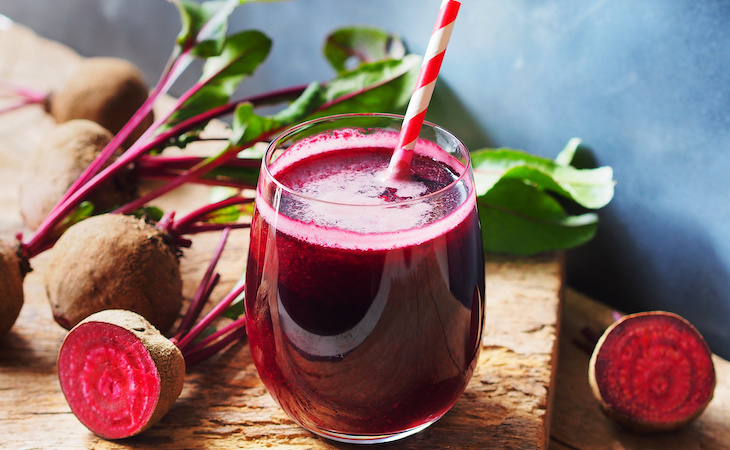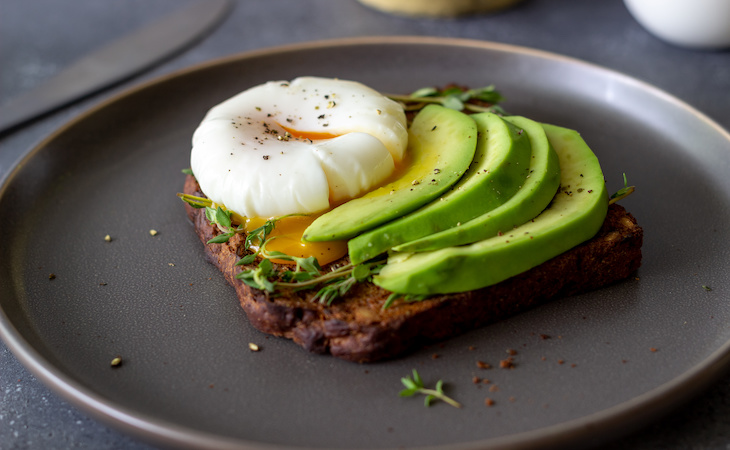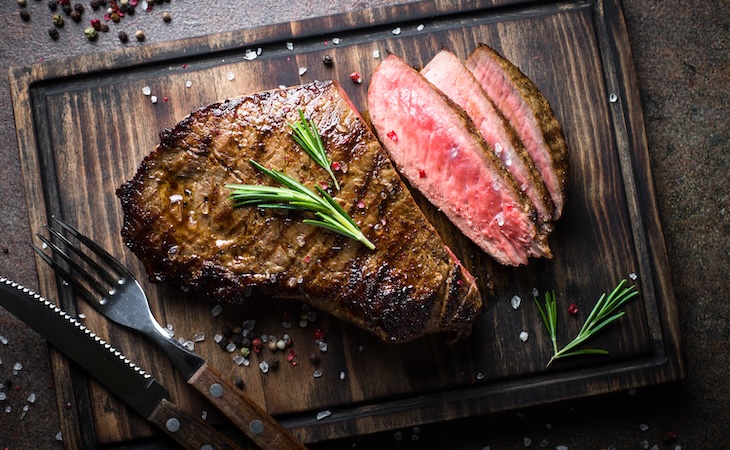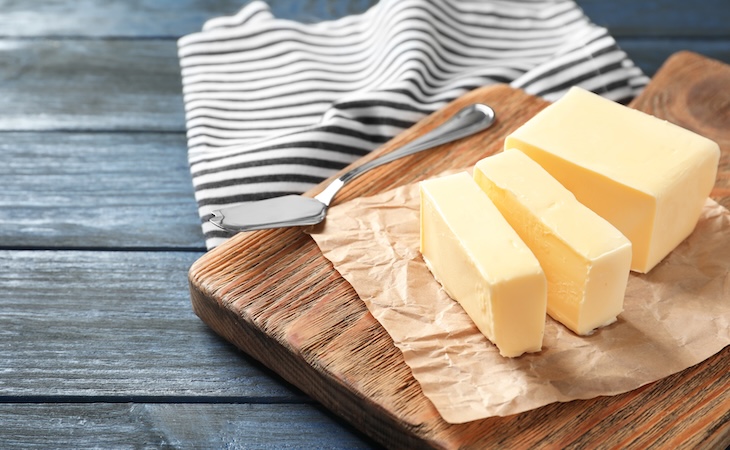There are a lot of ingredients out there that can potentially improve sleep. While you can certainly take some of these ingredients as supplements, many of them actually come in juice form too. Think tart cherry juice and “the sleepy girl mocktail.”
These days, it’s beet juice, and beets in general, that are having a moment. But does beet juice help you sleep?
First, a few basics: Beets (known as beetroot in some parts of the world) are a root vegetable that can be cooked (boiled, sauteed, or baked), eaten raw (it can be added to salads or you can drink it as juice), or ingested as a tincture or concentrated extract, says Stacy Mobley, licensed naturopathic doctor and certified professional coach.
They’re readily available in most areas and have many health benefits. In fact, they’re a one-stop shop for many important nutrients and minerals, says Mobley. Beets are high in fiber, vitamin C, B vitamins (especially folate), potassium, and iron, she notes. [1]
Plus, beets have a sweet taste, which can make them more tolerable to ingest in juice form. Ahead, we’ll explore the possibility of drinking beet juice for sleep.
Does beet juice help you sleep?
Beets contain potassium, vitamin C, and fiber. Mobley says these nutrients can help to move certain biochemical pathways along “so that a person will not be woken up or experience delayed sleep due to dealing with those issues.” [2]
Apart from this connection between beets and sleep, Mobley says beets may lower blood pressure (reducing systolic blood pressure, or the top number). [3]
She also says beets can increase exercise capacity. They may decrease fatigue due to their high concentration of nitrates, which are converted to nitric oxide, something that allows more oxygen to flow through the body. [4]
In addition to increasing exercise capacity, all those nitrates in beets (which translate to converted nitric oxide that brings oxygen to the blood) can potentially aid in managing sleep disorders in people with chronic obstructive pulmonary disorder (COPD). COPD often disrupts sleep due to insufficient oxygen levels in the blood during sleep. [5]
“For those with sleep apnea, this diagnosis is usually preceded by longstanding health issues such as cardiovascular-related illnesses,” Mobley says. “The oxygen is a much-needed friend. It also helps to modulate a healthy blood pressure, when used regularly.” [6]
But Mobley cautions that no one should rely solely on beets when they’ve received any diagnosis. “A complete treatment plan is usually a better option than any single remedy, natural or not,” she says.
What’s the best way to drink beet juice?
You can eat beets at very nearly any time of day as long as it suits your routine. But if you’re eating beets to decrease your blood pressure, morning might be best so it’s regulated throughout the day.
For quick results, Mobley says drinking beet juice is a faster way for the nutrients to be absorbed by the body. For lowered blood pressure, Mobley recommends consuming 8 ounces of beet juice daily.
As for sleep, drinking a glass of beet juice at bedtime may improve your overall quality of sleep, according to one study that gave COPD patients beet juice at night. [5]
To further harness the benefits of beets, Mobley says you can add raw beets to a salad. Baked beets make for a great side dish as well, she adds.
However, this doesn’t mean you should consume nothing but beets day in and day out. “A balanced diet is the best way to reap continuous health benefits,” says Mobley.
She adds that it’s best to consult with your doctor before starting any new habit, even if it’s healthy. She also warns that beets can add a pink or red hue to your urine or feces, but this isn’t permanent.
Is there anyone who should avoid beet juice?
If you have diabetes, you should avoid drinking beet juice because the fiber is removed during juicing, which increases the absorption of sugar, explains Mobley.
When it comes to beets more generally, Mobley says those who are currently diagnosed with or have a past history of kidney stones shouldn’t eat them. “This root vegetable is high in oxalates, which inhibit the absorption of some micronutrients,” she says.
You should also avoid eating or drinking raw beets if you have Irritable Bowel Syndrome (IBS). They’re extremely high in fiber, which can exacerbate your symptoms.
Additionally, since beets can lower blood pressure, “Those with a history of hypotension [low blood pressure] should not drink [beet juice] as often as someone who does not have hypotension,” she says.
The bottom line: In general, it’s always a good idea to talk to your doctor before adding any new supplements to your routine.
FAQs
Are beets good for bed?
Yes! Beets contain things like potassium, vitamin C, and fiber, which Mobley says can help move certain biochemical pathways along. This means you might enjoy more continuous sleep and fall asleep quickly when you eat or drink beets.
Should I drink beet juice in the morning or night?
You can drink beet juice whenever it suits your routine, but if you’re looking to lower your blood pressure, morning is best so the ingredient can help regulate your blood pressure throughout the day. And if you’d like to use this ingredient for sleep, it’s best to drink beet juice before bed.
Can noshing on a banana at night help you sleep? Learn about the benefits of eating a banana before bed.
References
- U.S. Department of Agriculture: FoodData Central: Beets, raw. https://fdc.nal.usda.gov/food-details/169145/nutrients
- Mayo Clinic: Clinical Trials. Beetroot for the Regulation of Sleep. https://www.mayo.edu/research/clinical-trials/cls-20548778
- Jajja, A., Sutyarjoko, A., Lara, J., Rennie, K., Brandt, K., Qadir, O., & Siervo, M. (2014). Beetroot supplementation lowers daily systolic blood pressure in older, overweight subjects. Nutrition research (New York, N.Y.), 34(10), 868–875. https://doi.org/10.1016/j.nutres.2014.09.007
- Breese, B. C., McNarry, M. A., Marwood, S., Blackwell, J. R., Bailey, S. J., & Jones, A. M. (2013). Beetroot juice supplementation speeds O2 uptake kinetics and improves exercise tolerance during severe-intensity exercise initiated from an elevated metabolic rate. American journal of physiology. Regulatory, integrative and comparative physiology, 305(12), R1441–R1450. https://doi.org/10.1152/ajpregu.00295.2013
- Wisor, J. P., Holmedahl, N. H., Saxvig, I. W., Fjeldstad, O. M., Weitzberg, E., Grønli, J., & Engan, H. K. (2021). Effect of Dietary Nitrate Supplementation on Sleep in Chronic Obstructive Pulmonary Disease Patients. Nature and science of sleep, 13, 435–446. https://doi.org/10.2147/NSS.S279395
- Bock, J. M., Hanson, B. E., Asama, T. F., Feider, A. J., Hanada, S., Aldrich, A. W., Dyken, M. E., & Casey, D. P. (2021). Acute inorganic nitrate supplementation and the hypoxic ventilatory response in patients with obstructive sleep apnea. Journal of applied physiology (Bethesda, Md. : 1985), 130(1), 87–95. https://doi.org/10.1152/japplphysiol.00696.2020




